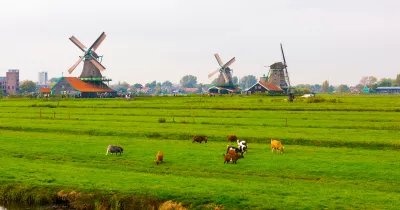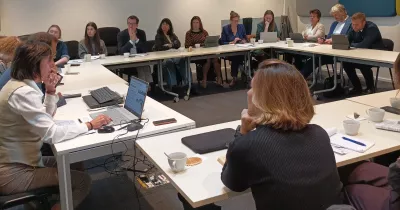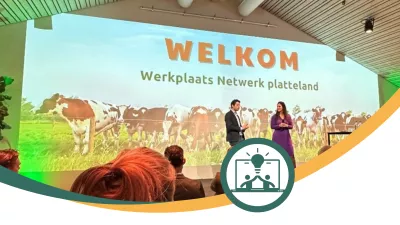The page is structured along the key elements outlined in the Policy Briefing ‘Making the Rural Pact happen in Member States’.
The examples and information provided below aim to inspire other EU Member States to take action, highlighting some of the relevant efforts made in the country by June 2025.
The information has been gathered by the Rural Pact Support Office national experts. It will be regularly updated with new information provided to the Rural Pact Support Office.
If you wish to share with us additional relevant initiatives, please contact us at communications[AT]rural-pact.eu.
-
70%
of the Netherland's territory is covered by rural areas -
18m
Over 18m people live in the Netherlands -
7.3%
of Dutch population live in rural areas
Source: Statistics Netherlands (CBS), using national definitions based on address density (<1,000 addresses/km²) and population centres. Rural population figure refers to those living outside officially designated population centres as of 2022. See: https://www.cbs.nl/
Key actions that support the implementation of the Rural Pact in the Netherlands
Designated government member and dedicated services for rural issues across policies
-
The Ministry of Agriculture, Fisheries, Food Security and Nature is the lead entity responsible for rural affairs in the Netherlands, while other ministries hold complementary responsibilities in areas such as spatial planning, mobility, public services, and regional development. Its mandate covers strengthening the socio-economic and ecological vitality of rural areas, ensuring sustainable food systems, and protecting nature.
Several dedicated departments within the ministry focus specifically on rural policies, including the Directorate-General for Rural Areas and Nitrogen-Based Pollution, the department of Rural Transition Areas, and the Programme Department for the National Programme Rural Areas and Transition Fund.
The Dutch Ministry of Agriculture, Fisheries, Food SecurityOpen link in new window has formalised its engagement to the Rural Pact by submitting a national political commitment. This commitment aligns the Netherlands with the shared goals of the EU rural vision.
-
The Ministry of the Interior and Kingdom Relations plays a key role in addressing territorial disparities through the National Programme for Vital Regions (NPVR) which supports long-term regional partnerships in 11 designated areas to enhance well-being, accessibility, and future prospects. The Ministry promotes regional vitality, democratic participation, and service provision in coordination with other ministries, regional governments, and civil society actors. Through NPVR, it facilitates inter-ministerial cooperation and links national policy priorities with region-specific development agendas.
Forward-looking vision implemented through a holistic strategy/action plan
-
The National Programme for Vital Regions (nl. Nationaal Programma Vitale Regio’s,NPVR), launched in 2025 by the Ministry of the Interior and Kingdom Relations, is a long-term strategic agenda to reduce disparities and secure future prospects for all regions.
It supports 11 designated areas to address persistent challenges through place-based cooperation and tailored action plans. Each region co-develops a plan and a four-year implementation agenda with the national government.
The programme brings together government bodies, social partners, businesses, and citizen initiatives to deliver tailored solutions for regions facing specific socio-economic and demographic challenges.
-
The Space for Agriculture and Nature (nl. Aanpak Ruimte voor Landbouw en Natuur) is a national policy framework that sets the strategic direction for reconciling environmental and rural land-use goals in the Netherlands. Led by the Ministry of Agriculture, Fisheries, Food Security and Nature, it aims to spatially integrate ecological goals – such as nature restoration, climate adaptation, and water quality – with the future viability of farming and rural communities.
The framework outlines spatial planning principles and strategic guidance to provinces, while aligning national funding and instruments through six thematic action lines: land use choices; agri-environmental management; innovation; socio-economic support; regulation; and land facilitation.
Regional example: Province of Overijssel
-
The Future for Our Countryside (nl. Toekomst voor ons Platteland) is the integrated strategy of the province of Overijssel to support rural transitions through ecological, economic and social development. The strategy coordinates area-based implementation across sectors such as agriculture, water, nature, climate, and community well-being.
A key pillar of the approach is the Liveable Countryside programme (nl. Leefbaar Platteland) which supports initiatives that enhance quality of life in rural communities—such as service access, housing, civic participation, and local leadership.
Along with tools such as the ‘3x3 approach’ (focused on ecology, earning capacity and community strength), the programme enables collaboration between municipalities, civil society and rural residents to ensure that rural transition remains grounded in local needs.
Regional example: Groningen and northern Drenthe
-
New Beginning (nl. Nij Begun) is a long-term recovery strategy for the gas extraction area in Groningen and parts of Drenthe. Developed in response to decades of mining-related damage and loss of public trust, the strategy addresses both physical restoration and socio-economic revitalisation.
Co-created with local communities, the strategy is based on area-specific needs. The programme provides a structural investment of EUR 200 million per year to support social and economic revival, complemented by a focussed EUR 1.65 package over 10 years dedicated to enhancing energy efficiency in housing (insulation).
Appropriate governance systems to facilitate coordination
-
As part of the National Programme for Vital Regions (nl. Nationaal Programma Vitale Regio’s –NPVR), the Dutch central government has appointed regional advisors and central government representatives from different ministries for each of the eleven designated regions. These representatives act as formal contact points to ensure alignment between national and regional governments.
Regional advisors, primarily staffed by the Ministry of the Interior and Kingdom Relations, promote inter-ministerial involvement, support coordination between governance levels, and monitor progress. Based on the identified challenges, all relevant ministries can be involved in the co-development and implementation of a 20-year strategic agenda and a four-year action plan per region.
-
The Netherlands has a strong bottom-up coordination through the P10 network, a coalition of 33 rural municipalities with large outlying areas and no dominant urban core. These municipalities face common challenges in maintaining service provision and quality of life.
The P10 network acts as a platform to exchange solutions, connect local expertise, and advocate for rural needs at national and EU levels. It supports collaborative planning between residents, public institutions and entrepreneurs to deliver tailored, place-based development strategies.
Mechanisms to coordinate the allocation of funding and ensure synergies
-
The CAP Coordination Body (nl. Regieorganisatie Gemeenschappelijk Landbouwbeleid) is the national coordinating entity for the implementation of the Common Agricultural Policy (CAP) in the Netherlands. It brings together the national government, provinces, water authorities, and the Dutch Rural Network to jointly deliver on the CAP.
The organisation monitors progress, facilitates knowledge exchange among partners, and ensures that policy adjustments are informed by evaluation. Its aim is to achieve synergies across sectors by supporting resilient agriculture, healthy ecosystems and vibrant rural communities.
-
The Netherlands Enterprise Agency (RVO) is responsible for managing the application, administration and payment of various EU subsidies and nationally funded schemes that support rural and regional development. This includes the implementation of LEADER under the European Agricultural Fund for Rural Development (EAFRD), as well as the regional cooperation Interreg programmes.
Through its role, the agency facilitates access to funding, provides guidance to local stakeholders, and contributes to better alignment between national and European funding streams.
Effective rural proofing and adequate data systems
-
Since 2021, national policymakers and regulatory authorities are obliged to include a Border Region Impact Check (nl. Grenseffectentoets) when developing new laws or regulations that may impact cross-border activities, particularly in border regions.
This check is intended as a mandatory quality criterion in the overall weighing of interests when designing a policy. The instrument aims to clarify how new or amended policy may affect citizens, companies, and public authorities in Dutch border regions. Although not specifically designed for rural development, it has particular relevance for rural border areas, which are often most affected by cross-border challenges.
-
The National Monitoring for Broad Welfare (nl. Nationale Monitor Brede Welvaart) is a comprehensive statistical tool developed by Statistics Netherlands (CBS) to assess well-being beyond economic performance. It uses over 100 indicators across three dimensions of well-being: economic, social, and environmental.
The monitor is published annually and includes national-level reporting and regional breakdowns. It supports evidence-based policymaking by offering insights into spatial inequalities, including in rural areas, and is increasingly used to inform regional and rural policy discussions.
-
In September 2025, the Netherlands is set to launch a Rural Review in partnership with the OECD. This 18-month process will analyse how rural development policies can be better aligned with rural needs, well-being, and long-term challenges.
The review will support the Ministry of Agriculture, Fisheries, Food Security and Nature, together with other departments, in applying rural foresight, improving policy coordination, and integrating rural proofing instruments. The objective is to strengthen institutional capacity, anticipate future transitions, and enhance the knowledge base for rural policymaking in the Netherlands.
Structures and mechanisms to engage with rural communities
-
The Rural Pact Netherlands is an informal platform that brings together national stakeholders to discuss rural development priorities and the implementation of the Long-Term Vision for Rural Areas (LTVRA) in the Dutch context.
Launched in 2024 with the support of the Rural Pact Support Office, the platform facilitates regular exchanges between rural networks, civil society organisations, local authorities, researchers and national representatives. It aims to strengthen the voice of rural areas and build shared ownership of long-term goals across governance levels and sectors.
-
The Dutch Village Association (nl. Landelijke Vereniging voor Kleine Kernen, LVKK) is the national umbrella organisation for provincial village associations in 11 of the 12 Dutch provinces. It provides a structured platform for rural communities to engage with public authorities and contribute to policymaking at regional and national levels. Key activities include:
-
National Rural Parliament
The National Rural Parliament (nl. PlattelandsParlement) is held every two years since 2005 and brings together over 300 representatives from rural communities, local authorities, NGOs and national institutions to discuss rural issues and influence policy.The 2024 edition put rural proofing on the agenda and led to the adoption of a Rural Edict, which affirms the autonomy of rural communities and their right to shape local development. Some provinces, such as Gelderland, are now preparing their own regional rural parliaments.
- ‘We Do It Together’ coalition
In 2024, the LVKK co-founded the We Do It Together coalition, a national platform of over 20 organisations working to amplify the voice of local initiatives. The coalition strengthens civic engagement through lobbying for adapted national legislation, improved financing mechanisms, and greater visibility of community-led development in policymaking. - ‘Village visions’ plans
The LVKK supports community-led planning through ‘village visions’ (nl. dorpsvisies). These village development plans are collaboratively developed by residents to outline a shared vision for their village's future and serve as a foundation for discussions with local governments. The LVKK assists communities in creating these visions to guide development and facilitate dialogue with authorities.
-
Capacity building and networking support for a broad array of actors and stakeholders
-
The LEADER Network Netherlands (LNN) is the national platform for the country’s 31 Local Action Groups (LAGs). It facilitates knowledge sharing, peer learning and communication between LAGs, and promotes the added value of the LEADER method nationally and at the EU level. LNN supports project implementation, gathers and shares examples of good practice, and advocates for community-led local development.
-
The Dutch Village Association (nl. Landelijke Vereniging voor Kleine Kernen – LVKK) is the national umbrella organisation for provincial village associations in 11 of the 12 Dutch provinces. It strengthens the capacity of rural actors by supporting over 4 000 local initiatives on peer learning, practical knowledge exchange and leadership development among active residents.
A key activity is the Village Renewal Award, organised every two years by LVKK to showcase and support innovative rural initiatives. The winning project is nominated for the European Village Renewal Award helping local leaders gain visibility, connect with peers from other countries, and exchange good practices on village development and revitalisation.
-
The European Partnership for Citizen Empowerment Foundation (EPCE) is a cross-border partnership of rural civil society networks in the Netherlands, Belgium (Flanders) and Germany (North Rhine-Westphalia). It promotes citizen-led rural development through transnational collaboration and knowledge exchange.
In 2024, together with the European Rural Community Alliance (ERCA), EPCE launched the ‘Compass for Local Empowerment’, a tool aimed at supporting grassroots involvement in implementing the EU’s Long-Term Vision for Rural Areas.
-
The Dutch Rural Network (nl. Netwerk Platteland) connects stakeholders working on rural and agricultural development under the Common Agricultural Policy (CAP). It promotes collaboration through events, thematic workshops and project clusters.
In 2023, the network hosted a national workshop day focused on liveability and socio-economic vitality, supporting networking between farmers, rural residents, NGOs and public authorities. The network plays a key role in fostering a culture of learning and cooperation around future-proof rural development.



